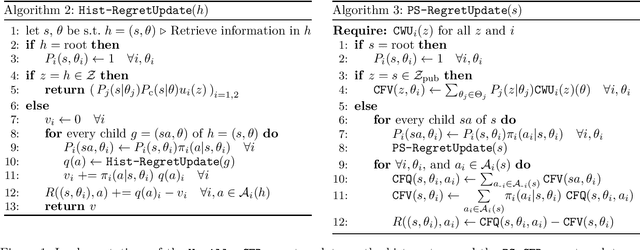Dominik Seitz
Qadence: a differentiable interface for digital-analog programs
Jan 18, 2024Abstract:Digital-analog quantum computing (DAQC) is an alternative paradigm for universal quantum computation combining digital single-qubit gates with global analog operations acting on a register of interacting qubits. Currently, no available open-source software is tailored to express, differentiate, and execute programs within the DAQC paradigm. In this work, we address this shortfall by presenting Qadence, a high-level programming interface for building complex digital-analog quantum programs developed at Pasqal. Thanks to its flexible interface, native differentiability, and focus on real-device execution, Qadence aims at advancing research on variational quantum algorithms built for native DAQC platforms such as Rydberg atom arrays.
Fast Algorithms for Poker Require Modelling it as a Sequential Bayesian Game
Dec 20, 2021

Abstract:Many recent results in imperfect information games were only formulated for, or evaluated on, poker and poker-like games such as liar's dice. We argue that sequential Bayesian games constitute a natural class of games for generalizing these results. In particular, this model allows for an elegant formulation of the counterfactual regret minimization algorithm, called public-state CFR (PS-CFR), which naturally lends itself to an efficient implementation. Empirically, solving a poker subgame with 10^7 states by public-state CFR takes 3 minutes and 700 MB while a comparable version of vanilla CFR takes 5.5 hours and 20 GB. Additionally, the public-state formulation of CFR opens up the possibility for exploiting domain-specific assumptions, leading to a quadratic reduction in asymptotic complexity (and a further empirical speedup) over vanilla CFR in poker and other domains. Overall, this suggests that the ability to represent poker as a sequential Bayesian game played a key role in the success of CFR-based methods. Finally, we extend public-state CFR to general extensive-form games, arguing that this extension enjoys some - but not all - of the benefits of the version for sequential Bayesian games.
 Add to Chrome
Add to Chrome Add to Firefox
Add to Firefox Add to Edge
Add to Edge